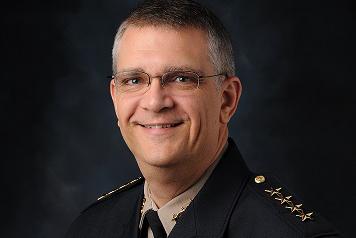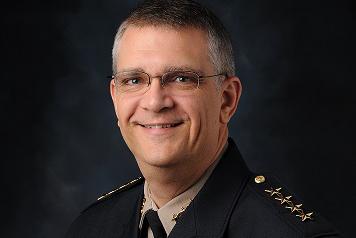

For the past nine months, Denver County sheriff deputies have been caught smack in the middle of a policy battle between federal immigration officials and Mayor Michael Hancock.
Immigration and Customs Enforcement has stepped up its presence in the city’s courthouses, where the sheriff’s department is tasked with keeping the peace. It’s been the deputies who have felt the day to day pressure from both sides about how to respond.
“We’ve gotten some attention,” said Denver Sheriff Patrick Firman, in his first interview about ICE since a new city law passed dictating how city employees handle immigration enforcement. “And I think a lot of people are looking to see what’s going to happen in Denver. This is about making sure our communities are safe.”
Immigrant rights groups and some city councilors have called for a halt on so-called notifications, when deputies alert ICE that someone they’re interested in will be released from a city jail. These advocates say the community doesn’t have as much trust in local police under President Trump’s administration and they cite a handful of instances in the past couple of months when people declined to press charges for crimes because they were worried about deportations.
But communication between ICE and local law enforcement about when inmates of interest are going to be released has been standard practice for a long time. ICE officials insist it’s important because making arrests in courthouses is safer for federal agents: people have already been screened for weapons.
Hancock and the City Council reached a compromise in August on a new law that explicitly bans city employees from helping ICE with immigration enforcement and asking people about status. But the law continues to allow notifications. Despite that, ICE criticized the new law saying it “deliberately obstructs our country’s lawful immigration system.”
Firman said all of the attention hasn’t been an easy road for his deputies. The department is already short-staffed and looking to hire 60 deputies. He did welcome the clarification in the law, so his deputies could know how they are supposed to handle immigration enforcement in the future. Training on the new standard has already started.
“I think there’s been a lot of conversations on both sides, and that’s all been part of this process, which is why coming to this agreement on this ordinance is so important,” Firman said. “We are going to cooperate with ICE when we have to. We believe there is limited but effective communication that needs to take place … but we can’t and will not do ICE’s job for them.”
Since deputies will continue notifying ICE when inmates of interest have posted bail, the biggest change will be in record keeping, Firman said. The new city law requires law enforcement keep track of how many notifications ICE requested in a given day, among other things.
“A lot of it is communication,” Firman said. “There’s a lot of misinformation on both sides.”
The sheriff’s union agrees. In an interview before the new ordinance passed, Frank Gale, who is representing the Fraternal Order of Police, said rank and file deputies were confused about when notification to ICE was supposed to happen.
“So staff is saying, are we supposed to notify them as soon as we know they’re going to be released? How much notice can we give them?” said Gale, who was previously fired from the sheriff’s department and has a pending lawsuit. “They are getting conflicting instruction on that.”
Firman said there should be no confusion now, that deputies are supposed to notify ICE when an inmate will be released as early as possible. This can be between a couple of hours to a full day before that inmate will actually be released — depending on how busy they are and other factors, he said.
He also emphasized that ICE is the one who initiates the conversation, that Denver sheriff’s deputies should never alert ICE about someone in the county’s custody, even if that inmate was an undocumented immigrant.
“We wouldn’t even know that information. We don’t ask those kinds of questions,” Firman said. “We would only know if ICE makes that request of us.”
Both Firman and Denver Police Chief Robert White say it’s important for the immigrant community to trust local police and understand they’re not enforcing federal immigration law.
“We do not work for ICE,” White said, at the recent bill signing of the new city law.
Firman echoed that sentiment: “This is about making sure our communities are safe for everybody who lives here. For the immigrant population, in making sure they feel safe to contact the police and they feel safe to come to court. That’s the main goal in all of this.”








